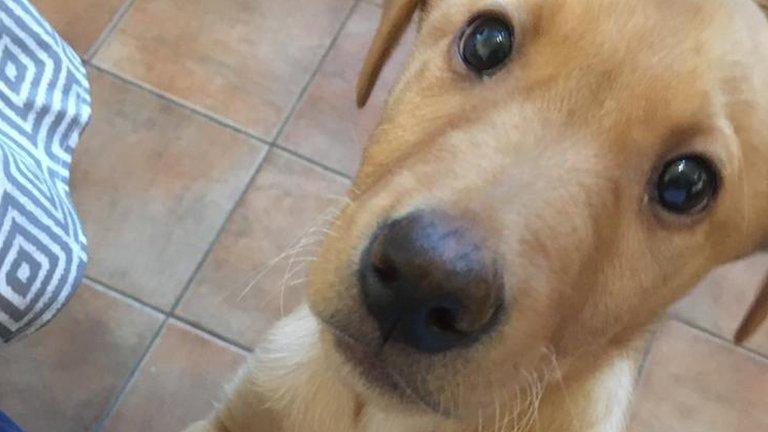NI the 'gateway' for black-market puppy trade across GB
- Published
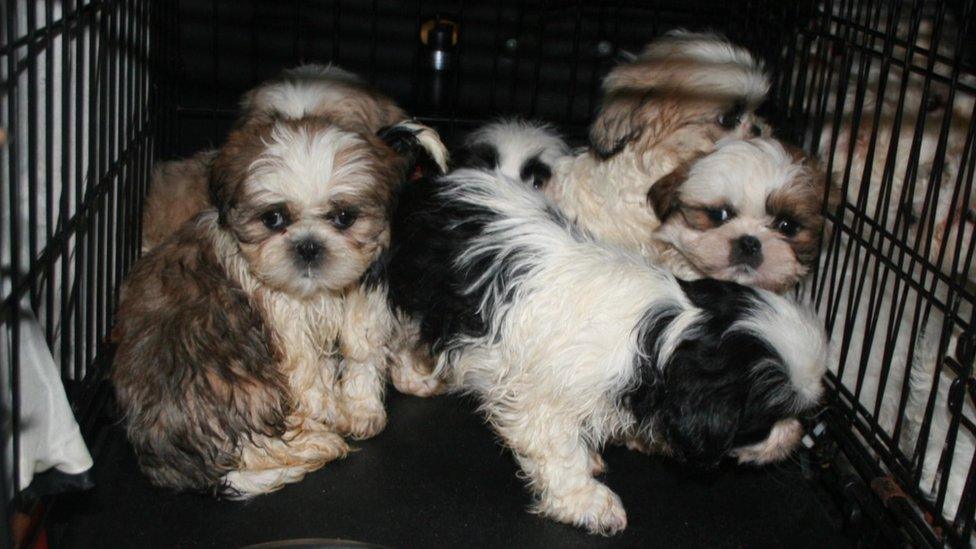
Dealers are shipping younger puppies out of the Republic of Ireland before the legal age of 15 weeks, the programme discovered
Northern Ireland is the gateway for a multi-million pound black market in puppies into Great Britain, according to an investigation by BBC NI's Spotlight programme.
Animal protection societies told the programme the illicit trade sees tens of thousands of dogs moved from the Republic of Ireland through Northern Ireland every year.
The demand for puppies has increased during lockdown.
Prices have been driven up as a result.
Reporter Mandy McAuley tracked dealers moving dogs and confronted one dealer from Coalisland, County Tyrone, who sold sick and dying puppies in Scotland.
The high demand has also increased incentives for dealers to ship younger puppies out of the Republic of Ireland before the age of 15 weeks, when they could be legally moved.
The Scottish Society for the Prevention of Cruelty to Animals (SSPCA) told the programme that members of three large extended family networks in Northern Ireland are responsible for much of the traffic in puppies across the Irish Sea.
'It's the new drugs'
"For the puppy trade in Scotland, I would say 90% of all problems come through Belfast," SSPCA Chief Superintendent Mike Flynn said.
"Considering last year we seized over 150 pups and at least 90% of them came over from Belfast.
"Whether they were bred in Northern Ireland or Southern Ireland, that is the route they came through.
"To me it's the new drugs - if you come into Cairnryan with £20,000 worth of drugs you are going to go to jail; £20,000 worth of pups, you'll get a £500 fine."
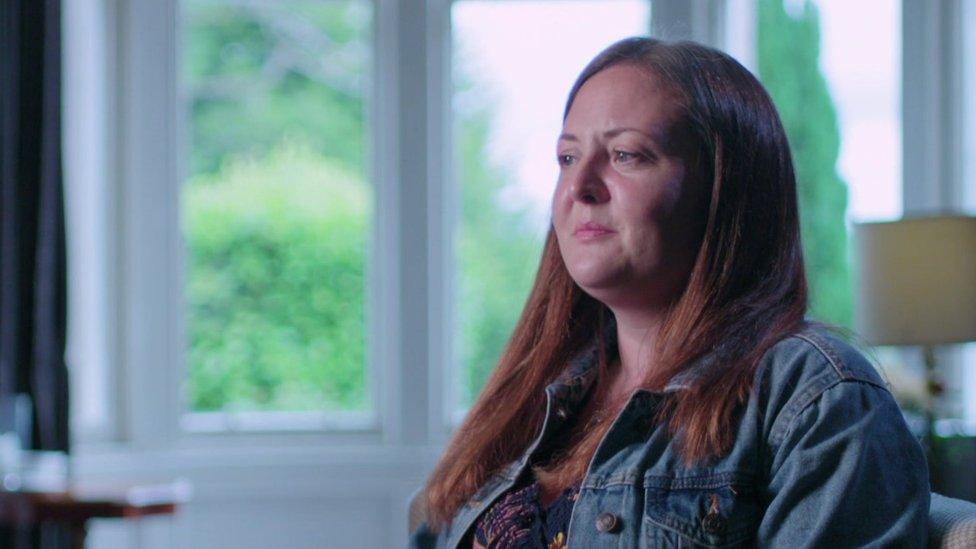
Stephanie Western spent thousands of pounds to keep her puppy alive after purchasing it
Speaking on BBC Radio Ulster's Good Morning Ulster programme, USPCA chief executive Brendan Mullan said it was a "lucrative" trade.
"We have been undertaking an undercover investigation ourselves, which helped inform the Spotlight programme, and identified the licensed pet transporters that are involved in this trade, collecting dogs from the south of Ireland, but also collecting dogs from illegal breeders in Northern Ireland and trafficking them into GB," he said.
"We are aware of 20 such transporters doing this. One them does 120 dogs a week and if you take the average price of £1,875 for a pup in GB, that individual has criminal proceeds of almost £16m a year."
The Spotlight team established that puppy dealer Bernard Ward, from Coalisland, had sold sick and dying puppies on at least five occasions in Scotland.
Stephanie Western, who spent thousands of pounds to keep her puppy, Thor, alive, said: "We obviously felt so stupid, gutted that we handed over, you know, our hard-earned money to these people who are just abusing these little animals.
"How is it so easy for people to just hop on a ferry with a load of sick dogs and just scam people?
"That is something that really needs to change; that is something that needs to be addressed."
Mandy McAuley then went undercover to buy a puppy which was also later traced back to Mr Ward.
Bonnie, the puppy purchased by the Spotlight team, was later found to be infected with two intestinal parasites.
That should have made the sale a criminal offence under Scottish law.
The puppy was treated and then adopted by a family in Scotland.
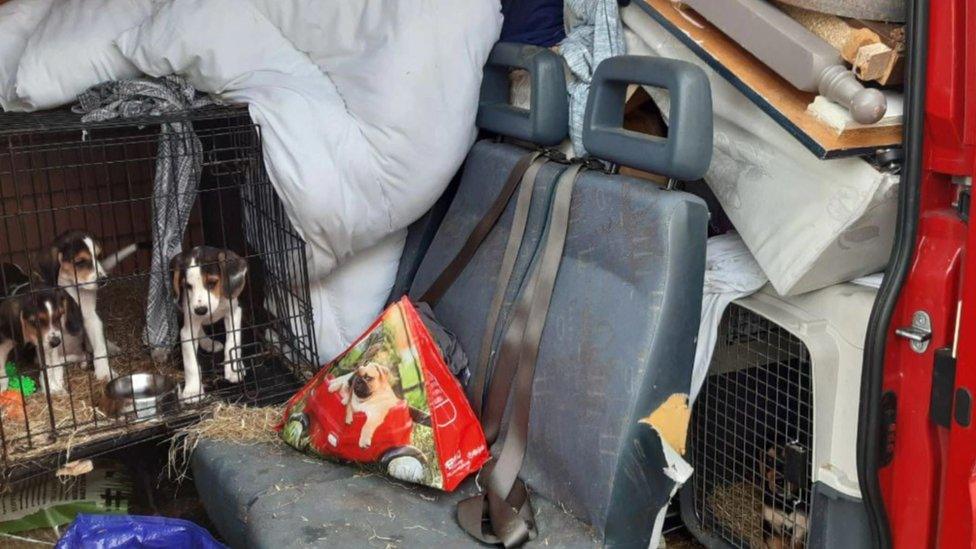
"It's a low-risk, high-gain opportunity to smuggle in puppies and make quick money," according to a former president of the British Veterinary Association.
Spotlight confronted Bernard Ward over the phone.
He insisted they had phoned the wrong number, but it was the same phone he used in one of the Scottish sales.
They also wrote to him, but he did not respond.
Daniella Dos Santos, a former president of the British Veterinary Association, told the programme: "Everybody wants a dog at the moment, and it's an emotional purchase.
"What these people are seeing, is low-risk, high-gain opportunities here to smuggle in puppies and make quick money without any thought for the people or the animals they are harming in the process.
"But what they do know, [is] that even if they're caught, the consequences are so low compared [to] if they're successful, which, is quite clear they are being successful, and the financial rewards that they get for it."
In a statement to the programme, Northern Ireland Agriculture Minister Edwin Poots said it is "not possible nor practical to stop every vehicle moving through Northern Ireland's ports".
However, he said multiple interceptions had been made in recent months, including 10 springer spaniel pups seized last month.
He said his department will do all it can to deter the trade in puppies and said his officials are working with local councils, the PSNI, the Harbour Police and ferry companies to identify suspect movements through the ports.
"No dog owner should have to see their pet suffer because it has been treated like a commodity and bred purely to line the pockets of lawbreakers," he said.
'Overbred, used and abused'
The USPCA believes that about one third of trafficked puppies will die.
"It is causing unthinkable suffering to thousands of dogs and that's not to mention the people at the other end of the supply chain, the unsuspecting public who have to deal with the human tragedy attached to those sick dogs they have purchased," said Mr Mullan.
"The mothers are overbred, used and abused and the pups are brought up in squalid conditions.
"Every single one of them has underlying health issues. They might look like they are healthy initially, but I can guarantee that they are all going to ill within weeks of purchase."
Related topics
- Published19 October 2021
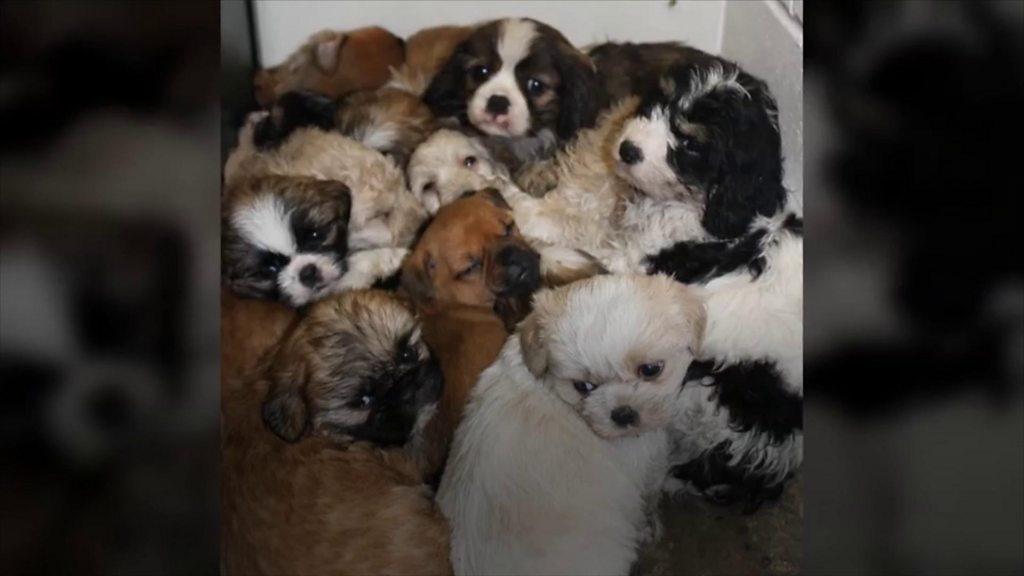
- Published26 December 2020
